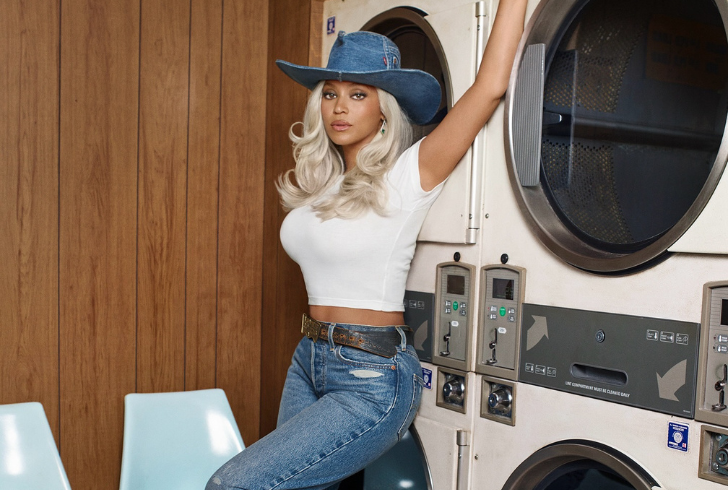Beyoncé’s Denim Ad Sparks Debate Amid Sydney Sweeney Backlash
The conversation around celebrity fashion campaigns just took an unexpected turn. Beyoncé, known for her powerful presence and bold fashion choices, is being pulled into a growing online debate—one that started with Sydney Sweeney’s American Eagle campaign and quickly snowballed into broader discussions about race, messaging, and historical context.
The Spark
Sydney Sweeney, star of “Euphoria”, found herself at the center of social media outrage after American Eagle launched their Fall 2025 campaign featuring her in a denim-on-denim look. The controversy wasn’t about the outfit—it was the messaging.
A voiceover in the campaign plays on a pun:
“Genes are passed down… My jeans are blue.”
This led into the tagline: “Sydney Sweeney has great jeans.”
Many viewers immediately caught the wordplay but weren’t amused. The pairing of a blonde-haired, blue-eyed actress with language referencing genetic traits stirred criticism. Some accused the ad of pushing outdated, racially charged ideas linked to eugenics—a deeply harmful pseudoscience.

Instagram | americaneagle | American Eagle’s new campaign, featuring Sydney Sweeney in a denim look, sparked social media outrage.
The Online Reaction
Critics pointed out that celebrating “great genes” using traditional Eurocentric beauty traits—blonde hair, blue eyes—could be read as tone-deaf.
Social media users argued that this sort of messaging reinforces outdated standards and ignores how harmful the idea of genetic “superiority” has been throughout history.
The backlash spread fast, drawing in other celebrities for comparison—especially Beyoncé.
Beyoncé’s Levi’s Ad Pulled Into the Crossfire
Soon after the Sweeney ad took off online, users began referencing Beyoncé’s recent Levi’s campaign. In it, the singer wears a full denim look, blonde hair styled to perfection, posing confidently.
Some posts placed both ads side by side. One viral comment read:
“So Beyoncé can pose in Levi jeans and it’s art… But when a white woman does it, it’s a national crisis?”
But others were quick to clarify: the problem wasn’t the styling—it was the message.
Beyoncé’s Levi’s campaign made no reference to genetics or superiority. It highlighted fashion, fit, and style—without dipping into controversial comparisons or historic symbolism. The distinction mattered.
Why the Comparison Doesn’t Hold
Many pointed out that Beyoncé’s Levi’s ad didn’t carry the same weight as Sweeney’s. It didn’t mention genetics—just focused on the denim. The issue with Sweeney’s ad wasn’t the outfit but the message.
Pairing visual cues with wording about “great genes” brought up harmful ideas tied to exclusion and superiority. For many, it echoed a history of oppression that made the ad feel more harmful than clever.
One commenter summed it up clearly:
“No one said Sydney’s look was racist. What was said is that implying ‘my genes are better’—while showing only blonde hair and blue eyes—carries historical baggage.”
Social Media’s Role in Shaping the Conversation
In today’s content-driven culture, brands walk a fine line. What may seem like clever wordplay in a boardroom can land differently once it hits the internet. Social media moves fast, and so does public opinion.
A user on X (formerly Twitter) went deeper, stating:
“Statements like ‘my genes are better’ may sound playful, but to many, they aren’t harmless. They mirror painful ideologies—especially when backed by billion-dollar brands.”
Referencing Beyoncé didn’t shield the campaign—it only intensified the conversation.
Beyoncé’s Broader Impact in Fashion

Instagram | beyonce | Beyoncé’s partnership with Levi’s, which began in 2024, is all about self-expression.
Beyoncé’s partnership with Levi’s began in 2024 and has consistently celebrated self-expression through style. Unlike Sweeney’s ad, her campaigns have stayed clear of controversial themes and focused purely on the denim—its craftsmanship, comfort, and versatility.
The latest Levi’s capsule she fronted brought attention to bold silhouettes, inclusive sizing, and a clear focus on individuality. Instead of relying on slogans or layered innuendos, the visuals spoke for themselves, radiating confidence and clarity.
Even when surrounded by public discourse, Beyoncé remains focused on the fashion, not the implications.
The Conversation Continues
Online debates like these show how marketing, culture, and history are deeply intertwined. Beyoncé’s inclusion in the Sydney Sweeney backlash reveals how quickly narratives shift, even when the comparisons aren’t aligned.
The key difference lies not in the visuals but in the story being told. Brands are being held accountable not just for what they show but also for what they imply. In the digital age, nothing is viewed in isolation, and context is everything.